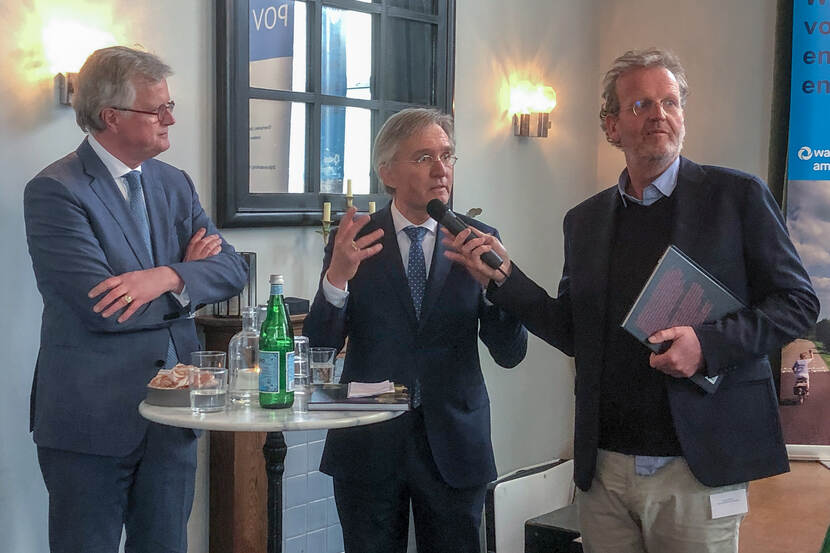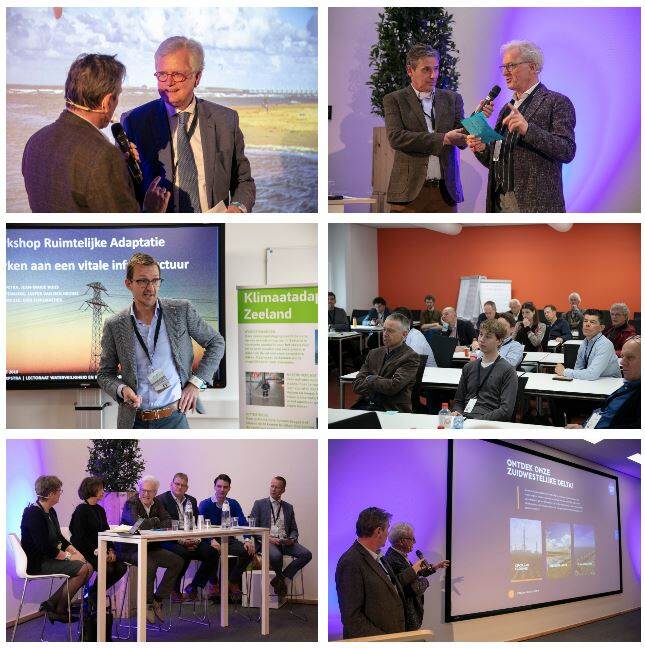Delta Programme Commissioner on the road
Over the past two weeks, Delta Programme Commissioner Peter Glas has spent a great deal of time on the road. He has travelled to Rotterdam, Middelburg, and Amsterdam, among other places, to discuss topics such as the rising sea level, flood risk management, and climate adaptation.

On Monday, 4 March the Delta Programme Commissioner attended the Flood Risk Management Day in Rotterdam, organised by the Hollandse Delta district water board. The key question at this conference was “How can we keep the Netherlands dry?”. And more specifically, “What challenges will we be facing in the Southwest Delta?” Guest speaker Professor Stefan Aarninkhof emphasised that knowledge development is of the essence. Large-scale field tests, he said, are paramount. “Garnering support among the public involves quite a process, which must not be underestimated. It may take years. And once you actually start applying knowledge in a project, you need people with leadership skills, with a vision. People who are not afraid to venture into action and take the lead.”
In Rotterdam, Peter Glas said: ‘Yes, the climate is changing. And we must have answers whenever answers are needed.’ He stated that the Netherlands is flood-proof and that the measures we are currently implementing will suffice until 2050. “At this time, there is no need to take sharp turns. Yet we do need to look ahead, because beyond the horizon, exciting times await us. Such times call for innovation, pooling expertise, and courage.” ‘We must take level-headed action’, Mr Glas stated. ‘Stay alert. And be prepared.’
Amsterdam-Rijn Canal
The Amsterdam region is also focusing additional attention on the rising sea level. On 14 March, water board council chair Gerhard van den Top had invited Peter Glas to attend informal administrative consultations with several committee chairs of the Amstel, Gooi en Vecht district water board, Mayor Heiliegers of Uithoorn, and Nienke Bagchus of Rijkswaterstaat [the executive branch of the Ministry of Infrastructure & Water Management].
At the meeting, the Delta Programme Commissioner was informed about the outcomes of an exploratory study into the future resilience of the Noordzee Canal – Amsterdam-Rijn Canal water system. As a result of the combination of increasing torrential downpours, sea level rise, and salinisation, this system will be approaching its limits in the near future. The conclusion was that such insights must be accommodated in the six-year review of the Delta Plans, in particular those pertaining to freshwater supplies and the IJsselmeer Region.
Sea Level Rise Knowledge Programme
Both in Rotterdam and in Amsterdam, the Delta Programme Commissioner reiterated that the government is not leaving the regions to fend for themselves in tackling the challenges associated with a potentially accelerated rise in sea level. In this context, he reported that in early March, Minister of Infrastructure & Water Management Cora van Nieuwenhuizen sent a letter to the House of Representatives announcing the initiation of a Sea Level Rise Knowledge Programme. This new knowledge programme is focused primarily on reducing uncertainty regarding the developments in Antarctica, an issue that requires fundamental research and international collaborative efforts. In addition, it will examine the tenability of the current strategy regarding sand replenishment and flood defence systems. Up to what level of sea level rise will this strategy suffice? And what additional interventions could be required and feasible in this respect?
The broadly supported approach of the Sea Level Rise Knowledge Programme is being developed in collaboration with all the Delta Programme partners. The expertise and insights generated by the programme will be used in the 2026 review round of the Delta Programme to enable substantiated and well-considered choices regarding the future of the Netherlands.

Southwest Delta
At the Southwest Delta working conference, which was also held on 14 March, Delta Programme Commissioner Peter Glas once more underscored the importance of collectively tackling the taskings in the fields of flood risk management, freshwater supplies, and spatial adaptation. He expressly called on the parties and organisations involved to contribute ideas. One of the questions raised during the conference was, “Can we continue to live here?”. Peter Glas answered: ‘Yes, provided we are alert and prepared. We are keeping a finger on the pulse. And if circumstances change, we will adapt in a flexible manner, joining forces with your region, as we are doing in all the other regions of our country.’
In conclusion
Delta Programme Commissioner Peter Glas: ‘Our efforts are focused on the same existential goal: preventing disasters. And that is by no means a simple task. Strategies are there to be adapted wherever necessary. We need to be flexible. If we want to change course, then we need alternative routes.’ The Netherlands cannot afford to make non-founded choices. That is why we have adopted an adaptive approach under the Delta Programme; rather than on a single scenario, it is based on a range of scenarios. ‘We know that the future is uncertain. That is why we are keeping all options open and why we are working hard on amassing knowledge in order to minimise the uncertainties.’